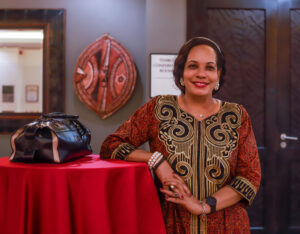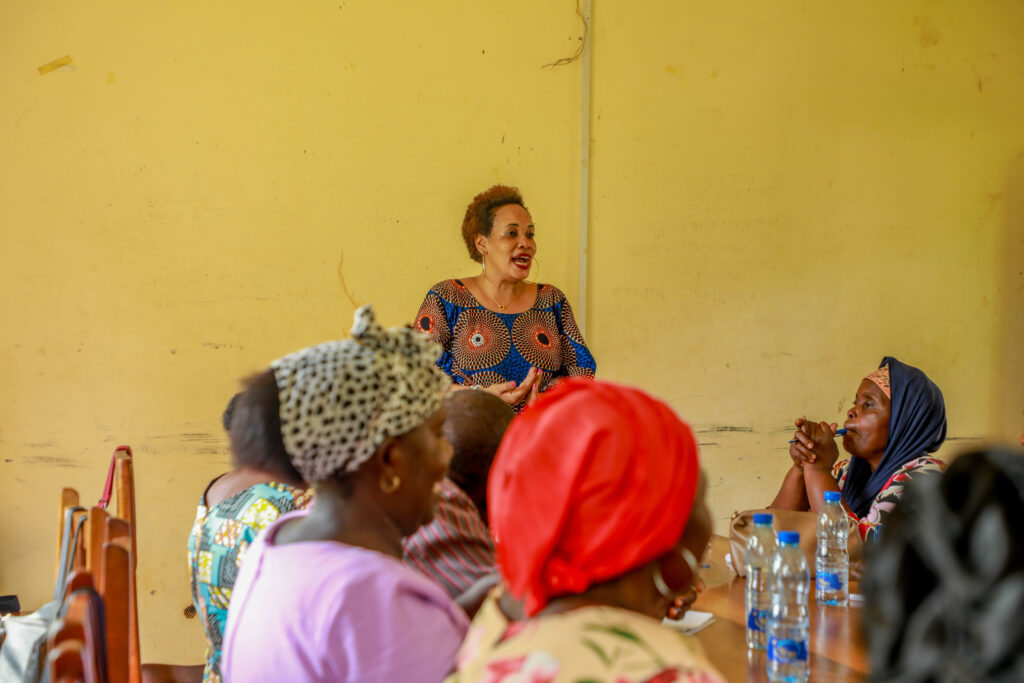
In Tanzania and across sub-Saharan Africa, breast cancer takes an especially heavy toll. Every year, thousands of women face this disease, with half of all deaths occurring in women under 50—often mothers of young children. The ripple effect of a single breast cancer diagnosis can stretch across generations, leaving behind maternal orphans and families struggling to survive. Dr. Mary Rose Giattas knows this ripple effect personally: as a teenager, she lost her own mother to breast cancer, leaving her family profoundly changed.
Today, Dr. Giattas leads a team determined to prevent other families from experiencing the same loss. With support from the USAID-funded MOMENTUM Country and Global Leadership project and the Pfizer Foundation, Dr. Giattas and Jhpiego’s team are implementing an innovative single-visit diagnostic approach to disrupt the cycle of breast cancer, bringing timely care and community-centered solutions to women across Tanzania.

The Ripple Effect in Numbers: From Diagnosis to Family Impact
A Chain Reaction of Loss
In sub-Saharan Africa, 50% of breast cancer deaths occur in women under 50, each death often leaves behind two maternal orphans. Breast cancer’s impact isn’t confined to the individual—it extends to children who lose their mothers, families who bear financial burdens and communities that lose caregivers and contributors.

80% Diagnosed Too Late
For most women in sub-Saharan Africa, breast cancer isn’t diagnosed until stage III or IV, when treatment options are limited. Late-stage diagnoses often mean a much lower chance of survival and leave families unprepared for the full financial and emotional impact.
The Realities of Access and Stigma
With limited health care resources, misinformation and social stigma, many women face significant obstacles to getting diagnosed early. Traditional beliefs or social pressures can deter women from seeking care. “Sometimes, I cry,” Dr. Giattas reflects. “I wonder, where was I to help these patients sooner? Why didn’t we reach them five years ago?”
Early Detection and Intervention: Breaking the Cycle
Jhpiego’s pioneering single-visit diagnostic model offers women in rural regions of Mwanza, Tanga and Zanzibar a comprehensive breast cancer diagnosis in just one visit. This model includes a clinical breast exam, diagnostic imaging and, if needed, fine-needle aspiration cytology—all in a single appointment. This innovation isn’t just a new model for care; it’s a lifeline for women with limited access to health care facilities who often struggle with the burden of repeated appointments. By reducing uncertainty, the single-visit approach provides women with a faster diagnosis and a sense of control over their health. Dr. Giattas and Jhpiego’s team are on a mission to change breast cancer outcomes through this model, combined with community-centered interventions that empower women with knowledge, resources and a clear path to care.
A Lifesaving Approach
- One Visit, Three Critical Steps: Women receive a clinical breast exam, imaging and cytology as needed, all in one location, minimizing the delay and uncertainty that often accompanies traditional multi-visit diagnostics.
- Connecting Care: With the support of patient navigators, women are not only diagnosed faster but are also connected to treatment centers, ensuring they receive continuous care after diagnosis.
Empowering Women and Transforming Communities
The single-visit model does more than just speed up diagnosis—it represents a fundamental shift in how women perceive and access care. By embedding breast cancer screening in regular health services, such as cervical cancer and HIV screenings, Jhpiego’s model normalizes breast cancer care, reducing stigma and making women more comfortable with preventive health measures.
Dr. Giattas and her team also lead outreach efforts to saturate communities with reliable information on breast cancer symptoms, breaking down long-standing myths and fears. In every community, they aim to create an environment where women are informed, supported and encouraged to seek care without fear. “This isn’t just about early detection,” Dr. Giattas says, “It’s about giving women the confidence to take control of their health and their lives.”
Investing in Women’s Health
“Women’s cancers are underfunded,” says Dr. Somesh Kumar, Jhpiego’s Senior Director for Technical Leadership. “But as women’s health advocates, we believe if we lead on this, the resources will follow.” Dr. Kumar draws parallels with maternal and child health progress over the last 25 years—an area once considered insurmountable but now thriving thanks to global support and targeted investments.
Through a multi-stakeholder effort involving the World Health Organization, Tanzania’s Ministry of Health and Jhpiego, this initiative is about much more than saving lives—it’s about shifting the future of women’s health in low-income countries. The impact could be as transformative as maternal health progress was a generation ago — paving the way for healthier women, stronger families and more resilient communities across Tanzania and beyond.
Achieving a Global Goal
The World Health Organization’s Global Breast Cancer Initiative, established in 2021, brings together global stakeholders to reduce breast cancer by 2.5 percent per year, which, over 20 years, would save 2.5 million lives.
To design country-specific and resource-appropriate health systems for the delivery of breast cancer care in low- and middle-income settings, the WHO 60-60-80 framework outlines three pillars of action:
• Focus on breast cancer early diagnosis so that at least 60% of breast cancers are diagnosed and treated as early-stage disease.
• Diagnose breast cancer within 60 days of initial presentation to improve breast cancer outcomes.
• Treatment should start within three months of the first presentation. Manage breast cancer so that at least 80% of patients complete their recommended treatment.
Aligned with this framework, Jhpiego has established these levers of action:
• Innovation
• Patient navigation
• Women-centric design
Maryalice Yakutchik is a senior writer for Jhpiego.



